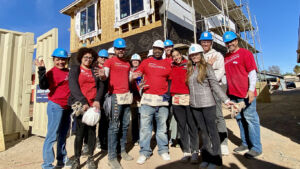Think about 1,000 young people from an economically disadvantaged part of the community getting ahead in life instead of falling behind early – a feat that resets their futures and stays with them for decades.
Educare Arizona marks some key milestones that highlight its impact on children, families, educators and the community. On Thursday, July 28, Educare Arizona welcomes its sixth class of children. In that class of 191 will be the 1,000th student Educare has served since opening its doors five years ago.
The impact of Educare Arizona doesn’t end with children. Also this month, Educare Arizona will welcome a group of new educators seeking their Child Development Assistant designation. In that group will be the 400th teacher that Educare Arizona has trained in its five-year history, establishing it as a local hub for training educators in early childhood education.
“The milestones we are celebrating this summer demonstrate that high quality early childhood experiences like Educare Arizona can make a permanent difference in the life of a child who might otherwise find his or her potential limited by life circumstances,” said Lisa Fernandez, chief development officer for Educare Arizona. “And Educare Arizona isn’t just about changing the paths of children. Our teacher training programs have been so successful that they are being shared with other Educare facilities across the country.”
One of the ways Educare Arizona is able to meet its staffing and teaching needs is by training professionals ready to enter the early care and education workforce and help them receive their Child Development Associate (CDA) certification through the Live and Learn Career Training Program.
This training and certification creates a career path in early childhood education for these individuals. The Live and Learn CDA Career Training Program is run in collaborative partnership with Southwest Human Development at Educare Arizona. The program is funded by non-profit Live and Learn with support from training partner Southwest Human Development. The course is equivalent to a program that would take two years at the community college level.
Our earliest experiences carry lifelong effects. Studies say that our first years are the most active period for establishing the neural connections that comprise our brain architecture. By age 3, children with college-educated parents or primary caregivers had vocabularies two to three times larger than those whose parents had not completed high school. Those children, from low-income environments, start school far behind their more advantaged peers – from having smaller vocabularies and being less likely to know their letters and numbers – a gap that persists to high school and is linked to high dropout rates, illiteracy, teen pregnancy and unemployment.
World-renowned economists have demonstrated that when parents and caregivers provide enriching environments for our youngest learners, the benefits far outweigh the cost. Without a high-quality early education, underserved children who are most at risk for academic failure are also:
- 50 percent more likely to be placed in special education
- 25 percent more likely to drop out of school
- 40 percent more likely to become a teen parent
- 70 percent more likely to be arrested for a violent crime
Educare Arizona’s mission is to provide the highest quality early childhood education to children and families in need — with almost 1,000 Phoenix children served over the past five years.
Children who experience Educare for a full five years arrive at elementary school performing on par with average kindergarteners, regardless of socio-economic standing, research shows and Educare children have more extensive vocabularies and are better able to recognize letters, numbers and colors than their peers. And early findings indicate the gains Educare children make hold as they move through elementary school.



